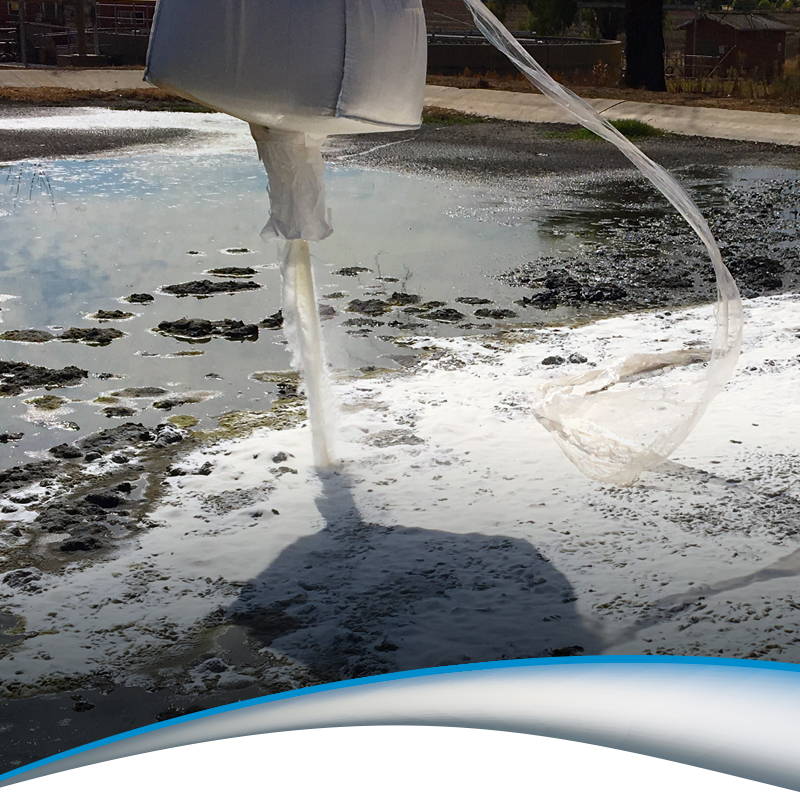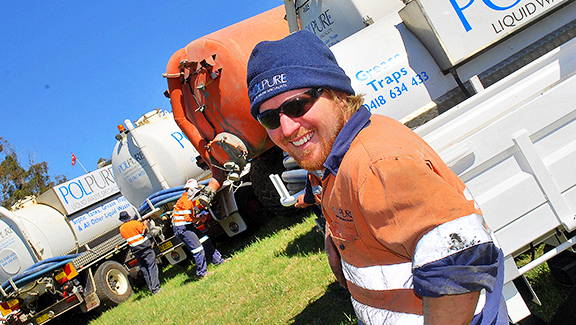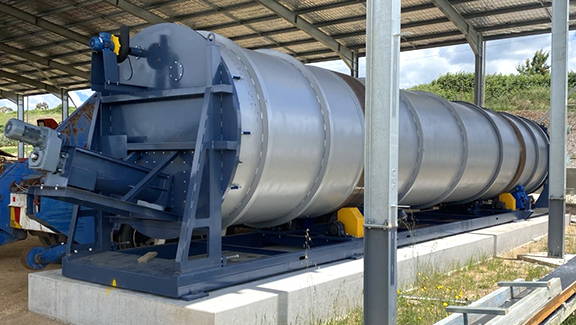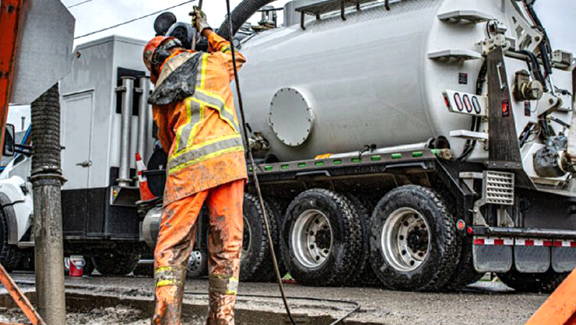


MetaFLO reagent takes liquid waste and solidifies it on-site within minutes, simultaneously eliminating the need for large volumes of bulking agent.
As a result, project managers can enhance their efficiency in achieving objectives by effectively managing a larger throughput of materials, including more efficient disposal capabilities.
Collect Liquid Waste
Apply Small Dosage
Mix Waste With MetaFLO
Transport to Destination


Application
MetaFLO solidification reagent is ideal for industries where drilling, tunnelling, hydro excavation and other applications generate liquid waste. We have reagents for Utilities, Construction, Oil & Gas, Energy, Local Authority Wastewater and Mining Industries.
MetaFLO makes liquid waste disposal easier, more cost-effective and environmentally sustainable - for almost any application.

Tunnelling &
Micro-Tunnelling
- Dries tunnel spoils immediately to move off site.
- Reduces the surface operational footprint.
- Direct to beneficial reuse options as clean, dry fill.
- Low dosage to solidify means less transportation and lower cost.
Horizontal Directional Drilling (HDD) / Vertical Drilling
- Dries liquid mud and cuttings quickly.
- Greater disposal/reuse options as a solid material.
- Low dosage rates to solidify means less transportation and lower cost.
- Mitigate risk for liquids transportation.
- Meet regulatory compliance criteria for solids.
- Can be used with brine based oil and gas cuttings.

Utilities
- Dries silt water runoff immediately.
- Prevents pollution.
- Eliminates the need for costly tankers.
- Less disruption to the general public.
- High cost savings.
- For more information and to arrange a trial please get in touch.
Hydro Excavation
- Dries hydro-excavation material very quickly
to move off site. - Can increase on-site vac efficiency with
solidification on-site. - Improve disposal options as a solid clean material.
- Meet regulatory compliance for improved
risk mitigation. - Low dosage rates save time with simple
mechanical mixing.

Stormwater Ponds
- Dry up quickly to improve beneficial re-use opportunities for sediment.
- Small operational footprint with simple mechanical mixing saves time and cost.
- Low dosage requirements will reduce transportation and disposal costs.
- Works effectively in tight places or residential environments.


Benefits
We understand when it comes to your project you have three main objectives. PureFLO supports you in achieving these objectives.
Complete on Time
Reduce Costs
Liquid waste can often come out wetter than expected, or for whatever reason, can take longer to dry than anticipated. MetaFLO can rapidly accelerate the speed in which your liquid waste dries, increasing throughput and ensuring you complete your project on time.
Eco-Friendly


Environmental Considerations
When MetaFLO solidifies liquid waste on-site there are environmental benefits throughout every stage of the disposal process.

Is MetaFLO Biodegradable?
What happens to the water previously retained during degradation?

MetaFLO v Cement
MetaFLO is significantly quicker to react than cement, solidifying within 20-30 minutes. It is also easier for handling, storage and transporting and does not affect pH levels.

Environmental Comparisons
- Cement contains hexavalent chromium which is a genotoxic carcinogen.
- Most muds treated with cement significantly increase the pH level requiring the material to be disposed of at a specialist location.
- Cement also adds more weight to the waste – increasing cost to transport and handle.
- The production of cement is very energy intensive and releases a lot of carbon dioxide into the environment contributing to global warming (4-8% of annual production); production of one tonne of cement creates 780 kg of carbon dioxide.
- Cement dust can be a dangerous source of air pollution.
- Cement must be handled with caution wearing appropriate PPE as it is very alkaline.
- Cement increases carbon dioxide emissions from having more trucks on road to transport treated waste + reagent.
- Cement can cause eye, skin, and respiratory irritation that can lead to silicosis.
- Cement creates a hard, monolithic finish that can be hard to work with.
- No potential reuse.
- Cement can Impact biodiversity of surrounding fauna (all species)
To discuss your waste solidification requirements, or arrange a site visit please Call 02 6365 4433 or
News and Insights

MetaFLO reagent takes liquid waste and solidifies it on-site within minutes, simultaneously eliminating the need for large volumes of bulking agent.
As a result, project managers can enhance their efficiency in achieving objectives by effectively managing a larger throughput of materials, including more efficient disposal capabilities.

MetaFLO reagent takes liquid waste and solidifies it on-site within minutes, simultaneously eliminating the need for large volumes of bulking agent.
As a result, project managers can enhance their efficiency in achieving objectives by effectively managing a larger throughput of materials, including more efficient disposal capabilities.
Collect Liquid Waste
Apply Small Dosage
Mix Waste With MetaFLO
Transport to Destination
(approximately 0.5%).
Grease Trap
Our fleet of vacuum trucks are specifically designed to accommodate small tight jobs to large big tankers; all fitted with fresh water and high pressure pumps. We offer you a very competitive price to remove, clean and dispose of your grease trap waste without cutting corners. Our trucks will service your grease trap at a time which is convenient to your business and ensure we do not affect your customers.

Grease Trap
Our fleet of vacuum trucks are specifically designed to accommodate small tight jobs to large big tankers; all fitted with fresh water and high pressure pumps. We offer you a very competitive price to remove, clean and dispose of your grease trap waste without cutting corners. Our trucks will service your grease trap at a time which is convenient to your business and ensure we do not affect your customers.



Utilities
- Dries silt water runoff immediately.
- Prevents pollution.
- Eliminates the need for costly tankers.
- Less disruption to the general public.
- High cost savings.
- For more information and to arrange a trial please get in touch.
Hydro Excavation
- Dries hydro-excavation material very quickly to move off site.
- Can increase on-site vac efficiency with solidification on-site.
- Improve disposal options as a solid clean material.
- Meet regulatory compliance for improved risk mitigation.
- Low dosage rates save time with simple mechanical mixing.

Stormwater Ponds
- Dry up quickly to improve beneficial re-use opportunities for sediment.
- Small operational footprint with simple mechanical mixing saves time and cost.
- Low dosage requirements will reduce transportation and disposal costs.
- Works effectively in tight places or residential environments.

Application
MetaFLO solidification reagent is ideal for industries where drilling, tunnelling, hydro excavation and other applications generate liquid waste. We have reagents for Utilities, Construction, Oil & Gas, Energy, Local Authority Wastewater and Mining Industries.
MetaFLO makes liquid waste disposal easier, more cost-effective and environmentally sustainable - for almost any application.

Tunnelling &
Micro-Tunnelling
- Dries tunnel spoils immediately to move off site.
- Reduces the surface operational footprint.
- Direct to beneficial reuse options as clean, dry fill.
- Low dosage to solidify means less transportation and lower cost.
Horizontal Directional Drilling (HDD) / Vertical Drilling
- Dries liquid mud and cuttings quickly.
- Greater disposal/reuse options as a solid material.
- Low dosage rates to solidify means less transportation and lower cost.
- Mitigate risk for liquids transportation.
- Meet regulatory compliance criteria for solids.
- Can be used with brine based oil and gas cuttings.


Benefits
We understand when it comes to your project you have three main objectives. PureFLO supports you in achieving these objectives.
Complete on Time
Complete your project on time or ahead of schedule.
Reduce Costs
Stick to the budget and cut costs where possible.
Eco-Friendly
Minimise your environmental impact.
Without adding vast amounts of cement, ash, or sawdust to solidify liquid waste, bulk is reduced almost completely , resulting in reduced transportation costs. Solids are also considerably cheaper to dispose of than liquids because they can be re-purposed or disposed of in landfill.
Liquid waste can often come out wetter than expected, or for whatever reason, can take longer to dry than anticipated. MetaFLO can rapidly accelerate the speed in which your liquid waste dries, increasing throughput and ensuring you complete your project on time.
With less bulk to transport fewer trucks are required, reducing emissions, fuel and labor costs. Then because you solidify on-site this allows you to eliminate the risk of transporting hazardous liquids. When MetaFLO is applied in the correct dosage material will also pass the liquid release test and even under moderate pressure will not release the liquids absorbed. Not only does this comply with more environmental regulations, but it reduces leaching as MetaFLO degrades over multiple decades inside landfill or other environments.


What happens to the water previously retained during degradation?

Environmental Considerations
When MetaFLO solidifies liquid waste on-site there are environmental benefits throughout every stage of the disposal process.
Is MetaFLO Biodegradable?

MetaFLO v Cement
MetaFLO is significantly quicker to react than cement, solidifying within 20-30 minutes. It is also easier for handling, storage and transporting and does not affect pH levels.
Environmental Comparisons

- Cement contains hexavalent chromium which is a genotoxic carcinogen.
- Most muds treated with cement significantly increase the pH level requiring the material to be disposed of at a specialist location.
- Cement also adds more weight to the waste – increasing cost to transport and handle.
- The production of cement is very energy intensive and releases a lot of carbon dioxide into the environment contributing to global warming (4-8% of annual production); production of one tonne of cement creates 780 kg of carbon dioxide.
- Cement dust can be a dangerous source of air pollution.
- Cement must be handled with caution wearing appropriate PPE as it is very alkaline.
- Cement increases carbon dioxide emissions from having more trucks on road to transport treated waste + reagent.
- Cement can cause eye, skin, and respiratory irritation that can lead to silicosis.
- Cement creates a hard, monolithic finish that can be hard to work with.
- No potential reuse.
- Cement can Impact biodiversity of surrounding fauna (all species)
To discuss your waste solidification requirements, or arrange a site visit please Call 02 6365 4433 or
Collect Liquid Waste
Apply Small Dosage
Mix Waste With MetaFLO
Transport to Destination


Application
MetaFLO solidification reagent is ideal for industries where drilling, tunnelling, hydro excavation and other applications generate liquid waste. We have reagents for Utilities, Construction, Oil & Gas, Energy, Local Authority Wastewater and Mining Industries.
MetaFLO makes liquid waste disposal easier, more cost-effective and environmentally sustainable - for almost any application.

Tunnelling &
Micro-Tunnelling
- Dries tunnel spoils immediately to move off site.
- Reduces the surface operational footprint.
- Direct to beneficial reuse options as clean, dry fill.
- Low dosage to solidify means less transportation and lower cost.
Horizontal Directional Drilling (HDD) / Vertical Drilling
- Dries liquid mud and cuttings quickly.
- Greater disposal/reuse options as a solid material.
- Low dosage rates to solidify means less transportation and lower cost.
- Mitigate risk for liquids transportation.
- Meet regulatory compliance criteria for solids.
- Can be used with brine based oil and gas cuttings.

Utilities
- Dries silt water runoff immediately.
- Prevents pollution.
- Eliminates the need for costly tankers.
- Less disruption to the general public.
- High cost savings.
- For more information and to arrange a trial please get in touch.
Hydro Excavation
- Dries hydro-excavation material very quickly to move off site.
- Can increase on-site vac efficiency with solidification on-site.
- Improve disposal options as a solid clean material.
- Meet regulatory compliance for improved risk mitigation.
- Low dosage rates save time with simple mechanical mixing.

Stormwater Ponds
- Dry up quickly to improve beneficial re-use opportunities for sediment.
- Small operational footprint with simple mechanical mixing saves time and cost.
- Low dosage requirements will reduce transportation and disposal costs.
- Works effectively in tight places or residential environments.


Benefits
We understand when it comes to your project you have three main objectives. PureFLO supports you in achieving these objectives.
Complete on Time
Reduce Costs
Eco-Friendly


Environmental Considerations
When MetaFLO solidifies liquid waste on-site there are environmental benefits throughout every stage of the disposal process.

Is MetaFLO Biodegradable?
What happens to the water previously retained during degradation?

MetaFLO v Cement
MetaFLO is significantly quicker to react than cement, solidifying within 20-30 minutes. It is also easier for handling, storage and transporting and does not affect pH levels.

Environmental Comparisons
- Cement contains hexavalent chromium which is a genotoxic carcinogen.
- Most muds treated with cement significantly increase the pH level requiring the material to be disposed of at a specialist location.
- Cement also adds more weight to the waste – increasing cost to transport and handle.
- The production of cement is very energy intensive and releases a lot of carbon dioxide into the environment contributing to global warming (4-8% of annual production); production of one tonne of cement creates 780 kg of carbon dioxide.
- Cement dust can be a dangerous source of air pollution.
- Cement must be handled with caution wearing appropriate PPE as it is very alkaline.
- Cement increases carbon dioxide emissions from having more trucks on road to transport treated waste + reagent.
- Cement can cause eye, skin, and respiratory irritation that can lead to silicosis.
- Cement creates a hard, monolithic finish that can be hard to work with.
- No potential reuse.
- Cement can Impact biodiversity of surrounding fauna (all species)
What Our
Customers
Think!
John Diffley - JT Cleary
"First and foremost I would like to thank you for all your help, support and technical advice during the Block Island Project. Your product was a great tool in the management of drilling spoils on our project"
News and Insights
What Our
Customers
Think!
John Diffley - JT Cleary
"First and foremost I would like to thank you for all your help, support and technical advice during the Block Island Project. Your product was a great tool in the management of drilling spoils on our project"
News and Insights
News and Insights



